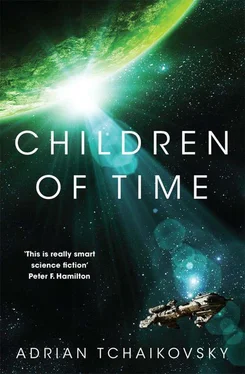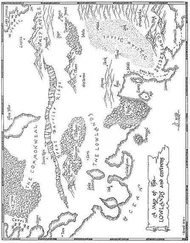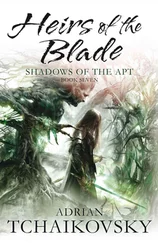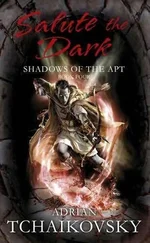They proceed with caution, and openly. There is a real possibility that the incumbents may chase them off; however, Portia can mentally put herself in their place, consider how she herself would look upon an intruder. She can think through the permutations enough to know that an aggressive or covert entrance will increase the chance of a hostile reception.
Sure enough, the locals are sharp enough to spot the newcomers quickly, and curious enough to make their presence known at a distance, signalling for Portia and her fellows to approach. There are seven of them, five females and two males, and they have a neat nest strung between two trees, liberally surrounded with trip lines to warn them of any over-bold visitors. Also present are a brood of at least two dozen spiderlings of various ages, hatched from a communal crèche. Fresh from the egg they are able to crawl and take live prey, and understand a variety of tasks and concepts without having to be taught. Probably no more than three or four of them will reach adulthood. Portia’s people lack a mammal’s helpless infant stage, and the maternal bond that accompanies it. Those that do survive will be the strongest, the most intelligent and the best able to interact with others of their kind.
The palp-semaphore language allows for communication over a mile away in clear conditions, but is not suitable for complex discussions. The more subtle step-vibration speech will not travel far across the ground or down a branch. In order to hold a free and frank exchange of views, one of the local females spins a web that stretches between several trees, large enough for everyone to rest a few feet on its many anchor points and follow the conversation as it progresses. One of the locals climbs onto the web and, at her invitation, Portia joins her.
We bring you greetings from the Great Nest on the Western Ocean , Portia begins, meaning: we are but three, but we have friends. We have travelled far and seen many things. For information is often a trade good in itself.
The locals remain suspicious. They are spoken for by their largest female, who shudders upon the web and shifts her feet, saying: What is your purpose? This is no place for you.
We do not seek to hunt , Portia states. We do not come to settle. We shall soon return to the Great Nest. Word has come to us – the concept is expressed very clearly, to their minds: vibrations twanging down a taut line. They are naturally equipped to think in terms of information transmitted at a distance. The land beyond your land is of interest.
Unrest amongst the locals. It is not to be travelled , their leader says.
If that is so, then that is what we have come to discover. Will you tell us what you know?
More disquiet, and Portia is aware that her mental map of what is going on must have a hole somewhere, because they are reacting in a way she cannot account for.
Their leader wishes to appear bold, however. Why should we?
We will tell you things in return. Or we have Understanding to exchange. For the spiders, mere telling and ‘Understanding’ are two distinctly different currencies.
The locals step back off the web at a signal from their leader and huddle close, keeping several eyes on the newcomers. There is a shuffling huddle of speech, softly stepped out so that it does not reach their visitors. Portia retreats as well, and her two companions join her.
Bianca has no particular ideas, save that she is anticipating having to go up against the lead female, who is noticeably bigger. The male, though, surprises Portia.
They’re afraid , he suggests. Whatever is ahead of us, they are afraid that we may stir it up and it will attack them.
It is natural for a male to think about fear, Portia decides. That she agrees with him makes finding out the truth about their destination all the more important.
At last the locals return to the web and negotiations resume. Show us your Understanding , their leader challenges.
Portia signals to Bianca, who unwraps one of the docile aphids from alongside her abdomen and displays it to the skittish surprise of the locals. The little beast is milked for honeydew, and Portia wraps up a sagging parcel of the sweet stuff and deposits it in the centre of the web, where the locals approach it.
Once they have tasted it, and once they understand Portia’s mastery over the animals, they are more than ready to make some manner of deal. The value of an independent food source is immediately evident to them, especially given their mysterious northern neighbours, who might soon threaten their hunting grounds.
What of these will you trade? the local leader asks, eagerness evident in her movements.
We have two of these beasts for those that give us a full account of what lies beyond your lands , Portia offers, knowing that this is not what the locals really wish to trade for. Also, we have eggs, but the raising and care of these creatures requires skill, or they will die young and you will have nothing.
There is now an urgent channel of talk running between the lead female and the others, and Portia catches fragments of it along the web. They are too agitated to be careful. You said you could trade? the big female demands.
Yes, we can trade this Understanding, but we will ask for more in return. Portia is not referring to teaching, but to something deeper – one of the secrets of her species’ continuing success.
The nanovirus itself is subject to variations in its transcription. It was designed that way in order to creatively accomplish its hardwired aim: to bring the host to a detected level of sophistication set by its creators and, once its victory conditions are met, to cease further assistance. Its creators included such safeguards so as to prevent their protégés continuing to develop into superhuman monkey-gods.
The virus was intended for a primate host, however, and so the end state that it has been programmed to seek is something that Portia labiata can never become. Instead the nanovirus has mutated and mutated in its inbuilt quest to reach an impossible goal, the end that justifies all conceivable means.
More successful variants lead to more successful hosts, who in turn pass on the superior mutated infection. From the microscopic point of view of the nanovirus, Portia and every other affected species on the planet are merely vectors for the onward transmission of the virus’s own evolving genes.
Long ago in Portia’s evolutionary history, her species’ social development was greatly accelerated by a series of mutations in the reigning infection. The virus began to transcribe learned behaviour into the genome of sperm and egg, transforming acquired memes into genetically inheritable behaviour. The economic, force-evolved brains of Portia’s kind share more structural logic with each other than chance-derived human minds do. Mental pathways can be transcribed, reduced to genetic information, unpacked in the offspring and written as instinctive understanding – sometimes concrete skills and muscle memory, but more often whole tranches of knowledge, ragged-edged with loss of context, that the new-born will slowly come to terms with throughout its early life.
The process was piecemeal at first, imperfect, sometimes fatal but more reliable with each generation as the more efficient strains of virus prospered. Portia has learned a great deal in her life, but some things she was either born with, or came to her as she developed. Just as all new-hatched spider-lings can hunt and creep and jump and spin, so Portia’s early moultings brought with them an innate understanding of language and access to fragments of her forebears’ lives.
Читать дальше












